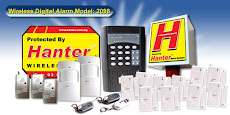On an average a burglar will only spend for to five minutes trying to break into a house and occur more during the day than at night. There are a few ways to increase your home security without it costing you a small fortune and requiring no more than a little common sense and little imagination. Here are a few tips that may just help you avoid being broken into.
A burglar will ring the door bell to see if you are home and when no answer – they have the cue.
Although 40% of break-ins occur by the burglar entering through an open door or window, another way is through the roof and man-hole (person-hole for the politically correct). Secure the manhole with a sliding bolt. I know there are other drastic ways to get around this, however, this is about making their life and job harder.
Don’t settle with sensor lights on the front porch alone. These are great but are normally placed in areas that do not help overly much. When placed too close the house it also makes it hard to for the person inside to see. Place sensor lights along side the house so that it lights up even the areas you don’t think about and so that the light sprays evenly across the drive way. This will help with your visibility as well.
If you own sliding doors you know how easy they are to break into. Place a screw into the track to prevent someone lifting the door out.
Drill a small hole through the frame at different intervals so that you can place a small metal rod, much like a key, in it. This will able to you keep the window or door open a little bit and keep it secure at the same time.
Another simple suggestion is placing dowel, a rod or broomstick handle firmly against the track to prevent the door from being open
Make sure there is adequate lighting for the yard
Planting thorny rose bushes by windows is a great and natural deterrent for burglars.
Gravel, loose stones or rocks is another natural alarm. (I recently had my front yard landscaped and can attest to this)
Keep trees and hedges neat and trimmed back. I know these can look great but they also serve as hiding spots and offer coverage for breaking in un-noticed.
Don’t leave your tools laying around the yard as these can be used to break into your house.
When you go away ask a neighbour to park their car in your driveway so there is still some activity. Also have someone open curtains and blinds during the day as well as collect any mail.
You may leave your house keys and alarm PIN number or remote control with a relative living nearby or a neighbour, so that they could check for you in the event of triggered alarm or false alarm. It is advisable to reset your alarm system with a temporary PIN number before giving it to them.
Don’t think for one moment that just because you have been broken into that it won’t happen again. Some times they strike twice because they know what you have, what you will replace and also because they know how to get in.

